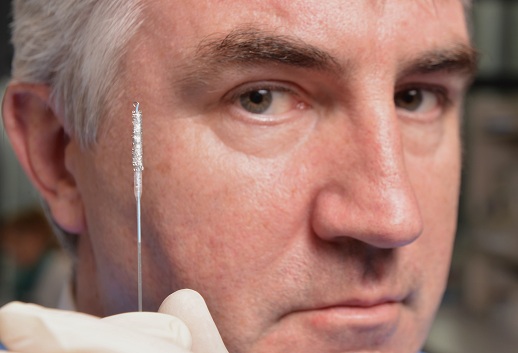2014 Press Releases
UCC device to help coronary disease

UCC’s Centre for Research in Vascular Biology has developed a new device that promotes the bypass of arterial obstructions, potentially removing the need for major surgery.
Worldwide, there are approximately three million open heart coronary bypass and peripheral artery bypass operations each year. These procedures involve major surgery with inherent risks of anaesthesia, ventilation, surgical trauma and potential complications such as kidney failure and wound infection. Around 20% of all patients requiring surgery are unable to undergo such bypass procedures because of the poor status of their arteries or co-existing illness that would make the risk of surgery too great.
Publishing in the latest issue of the prestigious journal Biomaterials, the research project (led by Professor Noel Caplice in UCC with collaborators in the Mayo Clinic, USA) has developed a vascular cell delivery device and tested it successfully in a large animal model with similar sized arteries to humans. The device is inserted via a keyhole procedure through the artery to the site of obstruction and promotes micro-bypass of this obstruction over a four week period. This results in the return of normal heart function and a recovery of full exercise capacity.
Professor Noel Caplice, Director of the Centre for Research in Vascular Biology at UCC and Chair of Cardiovascular Sciences says:
“If reproduced in humans this device would offer an alternative to open surgical bypass operations with implications for treatment of patients who are currently inoperable. It also has the potential to reduce costs and time spent in hospital.” Professor Caplice is a practicing interventional cardiologist.
Plans are now in place to test this technology over the coming years in patients who require bypass surgery but would otherwise be deemed unfit for surgical intervention.
“We anticipate that this work could be completed over the next 3-5 years,” says Professor Caplice.
This work originated from a question of how you could help a person to grow their own blood vessels without major surgery. While working at the Mayo Clinic Professor Caplice and colleagues designed a mesh device that could be attached to a stent which could deliver millions of cells which would promote bypass in an obstructed artery. Since returning to UCC in 2005 Professor Caplice has developed this technology so that it can be delivered using a catheter. He has proven the principle of his microbypass device on animals and the device is now ready to be tested in human subjects.
When the prototype of this device was first envisaged Professor Caplice worked with a bioengineering colleague in the USA who used a soldering iron and heatsink to put together the cell carrier component in a workshop at the back of his garage. Over time this technique was refined until a hybrid device carrying millions of cells could be safely delivered in an artery within the body. They discovered that the structure of the device’s fibre network and its coating were key to the efficient and long lasting placement of therapeutic cells in the device. This initial optimization took more than five years work.
The research was funded by grants initially from the National Institutes of Health (NIH-NHLBI) in the USA and more recently by Science Foundation Ireland.
The Centre for Research in Vascular Biology at UCC addresses fundamental questions in relation to cardiovascular disease. The Centre focuses on new therapies for heart repair and on discovering new technologies to treat severe vascular disease which is currently inoperable.
